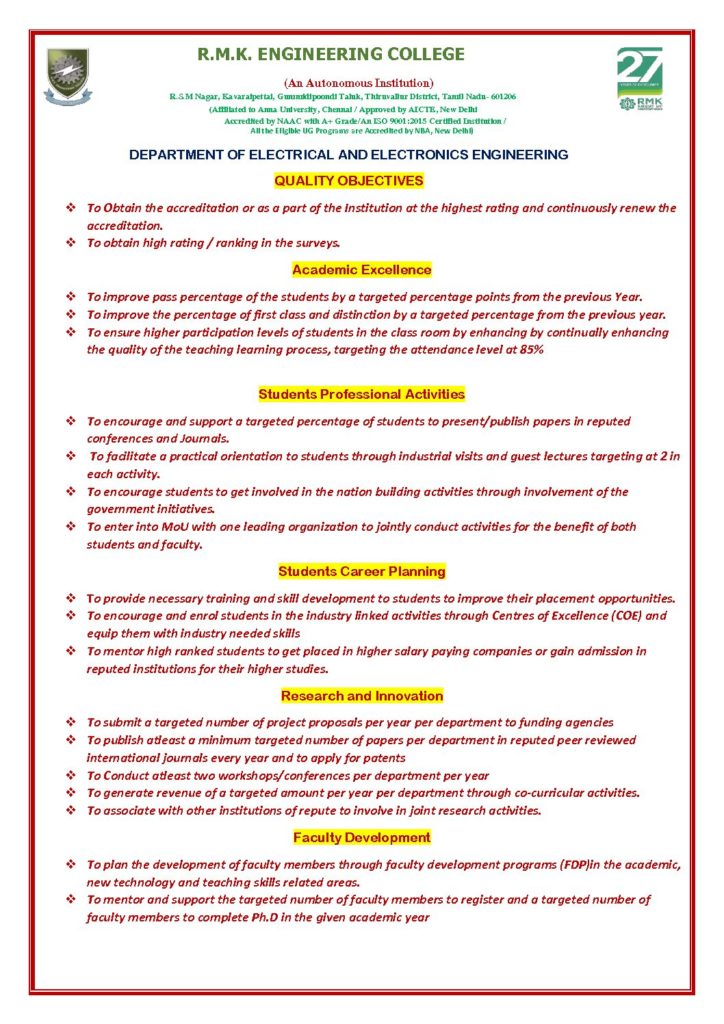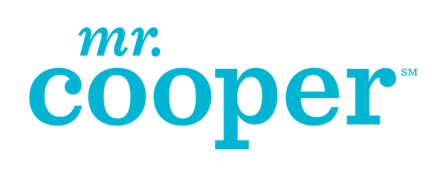About the Department
Courses Offered :
B.E – Electrical and Electronics Engineering
Knowledge Partner – HCL (Embedded Systems-40% Syllabus framed by HCL)
Honors degree offered
- Embedded system Technology
- Electric Vehicle Technology
- Smart grid Technology
- Control and Automation
- Renewable Energy Technology
- Power Electronics & Drives
Minor degrees offered
- Advanced Web development
- Artificial Intelligence & Machine Learning
- Data science
- Intelligent Health care
- Robotics & Automation
M.E – Power Electronics and Drives
M.S. / Ph.D.
The Department of Electrical and Electronic Engineering is established in the year 1995 with 60 students at the entry level. The intake is increased from 60 to 120 in 2007 and to 180 in the year 2011. The UG program is accredited by NBA from the year 2002 as given below.
| S.NO | YEAR | DURATION | VALIDITY |
|---|---|---|---|
| 1 | 2002 | 5 YEARS | 2007 |
| 2 | 2009 | 5 YEARS | 2014 |
| 3 | 2017 | 3 YEARS | 2020 |
| 4 | 2020 | 3 YEARS | 2023 |
| 5 | 2023 | 3 YEARS | 2026 |
The Department started a PG program in 2005 and is also recognized as a research centre by Anna University. The Department is equipped with well established laboratories with state of the art facilities..
The Department has a set of dedicated, talented, well qualified and experienced team as teaching faculty. All the faculty members are postgraduates with considerable research and academic experience. Eight faculty members are doctorates and Six of them are pursuing their Ph.D. Many of our faculty members are University 1st Rank holders either at UG level or at PG level. The Department also has qualified and dedicated supporting staff.
Recognized as Research centre by Anna University, Chennai and 12 candidates completed Ph.D and 30 are pursuing under recognized supervisors of our Department.
Vision and Mission
VISION
- To Mould the Young Professionals into Creative and Successful Electrical Engineers to meet with the Global Technological Challenges
MISSION
- To Provide World Class Facilities to Enhance Technical Expertise of Students.
- To Create Awareness in Cutting Edge Technologies to the Faculty through Continuous Improvement Programs.
- To Provide a Conducive Ambience for the Teaching–Learning Process.
- To Impart Industry Oriented Technical Skills and Equip Students to Meet with the Societal Developments.
- To Inculcate Ethical Values, Team Spirit, Leadership Quality and Flexibility in Budding Electrical Engineers.
PEOs, POs, PSOs
PROGRAMME EDUCATIONAL OBJECTIVES (PEOs)
B.E – Electrical and Electronics Engineering
- The graduates of the program will have strong foundation in Mathematics, Basic Sciences and Engineering fundamentals.
- The graduates of the program will excel in profession through effective communication, team work, leadership skills and ethical behavior.
- The graduates of the program will have competency in providing optimal solutions to societal problems with a global outlook.
PROGRAM OUTCOMES (POs)
B.E – Electrical and Electronics Engineering
- Engineering knowledge: Apply the knowledge of mathematics, science, engineering fundamentals, and an engineering specialization to the solution of complex engineering problems.
- Problem analysis: Identify, formulate, review research literature, and analyze complex engineering problems reaching substantiated conclusions using first principles of mathematics, natural sciences, and engineering sciences.
- Design/development of solutions: Design solutions for complex engineering problems and design system components or processes that meet the specified needs with appropriate consideration for the public health and safety, and the cultural, societal, and environmental considerations.
- Conduct investigations of complex problems: Use research-based knowledge and research methods including design of experiments, analysis and interpretation of data, and synthesis of the information to provide valid conclusions.
- Modern tool usage: Create, select, and apply appropriate techniques, resources, and modern engineering and IT tools including prediction and modeling to complex engineering activities with an understanding of the limitations.
- The engineer and society: Apply reasoning informed by the contextual knowledge to assess societal, health, safety, legal and cultural issues and the consequent responsibilities relevant to the professional engineering practice.
- Environment and sustainability: Understand the impact of the professional engineering solutions in societal and environmental contexts, and demonstrate the knowledge of, and need for sustainable development.
- Ethics: Apply ethical principles and commit to professional ethics and responsibilities and norms of the engineering practice.
- Individual and team work: Function effectively as an individual, and as a member or leader in diverse teams, and in multidisciplinary settings.
- Communication: Communicate effectively on complex engineering activities with the engineering community and with society at large, such as, being able to comprehend and write effective reports and design documentation, make effective presentations, and give and receive clear instructions.
- Project management and finance: Demonstrate knowledge and understanding of the engineering and management principles and apply these to one’s own work, as a member and leader in a team, to manage projects and in multidisciplinary environments.
- Life-long learning: Recognize the need for, and have the preparation and ability to engage in independent and life-long learning in the broadest context of technological change.
PROGRAM SPECIFIC OUTCOMES (PSOs)
B.E – Electrical and Electronics Engineering
After the successful completion of the program, the graduates will be able to
- Analyze the performance of complex interconnected Power system.
- Implement latest technological developments in the field of Control and Automation.
- Apply cutting edge technology to trouble shoot Electrical equipments
- Develop managerial skills to establish Startup Company in the field of Engineering and Technology.
Course Outcomes Overview
Quality Objectives


Dr. GEETHA RAMADAS M.E., Ph.D.,
PROFESSOR & HEADhod.eee@rmkec.ac.in
301

Dr. Meenakumari R M.E., Ph.D.,
Professorrmi.eee@rmkec.ac.in
305

Dr. Jothi Swaroopan N.M. M.E., Ph.D.,
Professorjothi.eee@rmkec.ac.in
304

Dr. T. Magesh M.E., Ph.D.,
Professortmh.eee@rmkec.ac.in
305

Dr. Kavitha P M.E., Ph.D.,
Associate Professor (Grade-II)pka.eie@rmkec.ac.in
302

Dr. A. Fayaz Ahamed M.E., Ph.D.,
Associate Professor (Grade-I)afd.eee@rmkec.ac.in
302

Mr. M. Thiyagesan M.E., (Ph.D).,
Associate Professor (Grade-I)mtn.eee@rmkec.ac.in
302

Ms. A. Jenifer M.E., (Ph.D).,
Assistant Professorajr.eee@rmkec.ac.in
302

Ms. Sabari L. Uma Maheswari M.E (Ph.D).,
Assistant Professorslu.eee@rmkec.ac.in
302

Dr. M. Vimala M.E.,Ph.D.,
Assistant Professormva.eee@rmkec.ac.in
302

Dr. K. Naresh Kumar M.E., Ph.D.,
Assistant Professornkr.eee@rmkec.ac.in
302

Dr. Y. Sukhi M.E.,Ph.D.,
Professorysi.eee@rmkec.ac.in
302

Dr. Y. Alexander Jeevanantham M.E., Ph.D.,
Assistant Professor (Grade-I)ajm.eee@rmkec.ac.in
302
Timetable
Digital Course Materials Overview

ELECTRICAL MACHINES LAB (430 Sq .m)
Equipments:
Electrical Machine lab is equipped with state of art of facilities which include 45 Machines of various types, transformers and requires measuring instruments, two rectifier units, AC supply-440/230v, DC supply-220V.The lab is provided with safety measures like ELCB, Fire extinguishers, Rubber mats, Proper earthing, MCBs in all the work benches.

POWER ELECTRONICS LAB (83 Sq.m)
Equipments:
Single phase Half and fully controlled bridge rectifier kit, Three phase SCR Half and Fully controlled bridge converter with I/M, SCR Parallel Inverter, IGBT Chopper - 4 quadrant, IGBT based PWM inverter, Transient characteristics of MOSFET and SCR, Parallel Inverter with power supply and rheostat, IGBT based Chopper, Single phase PWM inverter - IGBT based, Three phase PWM inverter - IGBT based with motor- 0.5 HP, SCR based voltage and Current Commutation module, AC voltage regulator using SCR, TRAIC, DIAC, MOSFET based step up and step down chopper, Resonant DC to DC converter, Cyclo Converter, Three phase PWM inverter - IGBT based, SCR based voltage and current chopper, AC voltage regulator using SCR & TRAIC, Resonant DC to DC converter, Single phase Half controlled bridge converter with R & RL load kit, Single phase fully controlled bridge converter with R & RL load kit, Three phase SCR Half controlled Rectifier, Audio Oscillator & amp; Digital Function Generator 3 MHz, CRO Scientific, Single phase fully controlled bridge converter , Single half phase controlled bridge converter with RL load kit, Single & amp; Dual RPS, Three phase half & fully controlled bridge converter, Single phase half-wave rectifier using SCR, SCR, MOSFET, IGBT, TRIAC Characteristics Kit. The lab is provided with safety measures like Fire extinguishers, Proper earthing, MCBs in all the work benches.
Softwares:
MatLab

CONTROL AND INSTRUMENTATION LAB (83 Sq.m)
Equipments:
DC position control, A.C. Servo position control system, P,PI,PID, Controller --Process Control Simulator, Speed measurement and closed loop control of A.C. Servo motor, D.C.Servo Motor Speed Torque Unit, Study of Synchro Transmitter & Receiver, Lag Lead network, Transfer Function of Armature controlled DC shunt motor, Transfer Function of separately excited DC shunt generator, Digital Storage Oscilloscope, Microcontroller based Speed Control of Stepper Motor, LVDT Calibrating kit & jig, Digital to Analog converter, Measurement of Iron Loss & Permeability, Maxwell's inductance bridge with DIB, Bourdon tube Trainer, ADC-8 Channel Standard module, Instrumentation Amplifier, Strain gauge kit, Schering bridge, Wheatstone Bridge, Kelvins double bridge, Galvanometer, DIB, DCB, DRB.The lab is provided with safety measures like FIire extinguishers, Proper earthing,MCBs in all the work benches.
Softwares:
MatLab

ELECTRIC CIRCUITS LAB (83 Sq.m)
Equipments:
Desk top Ammeter all ranges &Micro ammeter, Voltmeter Digital, DRB, DIB,DCB CRO Scientific, Audio Oscillator& Digital Function Generator - 3 MHz., Single& Dual RPS,The lab is provided with safety measures like FIire extinguishers, Proper earthing,MCBs in all the work benches.
Softwares:
MatLab

POWER ELECTRONICS AND DRIVES LAB (ME) (83 Sq.m)
Equipments:
MCS Family Microcontroller Trainer(micro 51 EB LCD), Stepper Motor Controller with Motor(VBMB 13A), TMS 320 LF2407A based DSP trainer kit, DS PIC30F4011 based controller card (micro 4011) 1HP 3 phase AC Induction Motor with spring balance load set up(PEC HV ACC3 S), Single phase SCR Power Circuit (PEC 14 HV4D), SRM Power Module (PEC 16DSM015), PMDC Motor � 180V 1 HP with spring balance set up, SRM with spring balance loading arrangement, VPE Spartan 3A/3A DSP FPGA controller, Three phase IGBT based Power Module (VPET 106A), Isolation Transformer, PIC 16F877 Project card (VPTB-03#1), MCS Family Microcontroller Trainer [MICRO 51 EB LCD] , 1.1 HP BLDC motor with load setup, 1.2 HP PMSM motor with load setup, DC-DC Buck-Boost Converter Trainer (VSMPS-07A), DSPIC 4011 Based chopper fed DC driver, DSPIC 4011 Based BDLC motor driver, Voltage regulation of three phase Synchronous generator (PEC14HV4H), DSPIC 30F4011 Based PWM Controller, IGBT Model, UPS Trainer Module, Single phase Power Quality Analyzer, Digital storage Oscilloscope 100MHZ bandwidth 1GS/S, Mechanical loading arrangement for PMDC motor.The lab is provided with safety measures like FIire extinguishers, Proper earthing,MCBs in all the work benches.

POWER SYSTEM SIMULATION LAB
Equipments:
Intel pentium 4, 4.3GHz, 1GB RAM, 80 GB HDD, 17' inch CRT.Keyboard &Mouse
Softwares:
Turbo C , Matlab ,EMTP

MICROPROCESSOR AND MICROCONTROLLER LAB
Equipments:
8085 Microprocessor,Z-80 Microprocessor, 6089 Motorola, Z-86/88 Microprocessor, Traffic light interface, Traffic Light Controller Board,Accessories - 26 Core, Dual DAC with ADC X temp Measure & control, AD 590 Transducer, Water bath Controller , Universal Screw Termination Board, 8251 x 8253 interface board, 8259 simulator (006) board, 8259 simulator (007) board, 8255 simulator (008) board,DMA interface board, Stepper Motor Interface Card, Stepper Motor Controller

ENGINEERING PRACTICE LABORATORY
Equipments:
DC Ammeter (0-15-30mA) DC Voltmeter (0-7.5-15-30V) 3Mhz Function generator BM-FG-3M DC Digital voltmeter MECO DC Digital Ammeter MECO Decade inductance box Multimeter Loading Rheostat Single phase Auto transformer AC portable Voltmeter Megger(CIE Make) Energy meter Resistive load AC Voltmeter Portable (0-230)V AC Ammeter Portable (0-10)A Digital IC Trainer Kit Dual Power Supply(0-30V)/2A CRO- 30MHZ Dual Channal Decade resistance Box 6Dial Decade Capacitance Box 6Dial Decade Inductance Box 6 Dial Single phase Wattmeter Three phase Auto Transformer Three phase Resistive load Portable Ac 600V Moving iron Volmeter AC (0-10)Ammeter Voltmeter(0-7.5-15-30) Voltmeter(0-30) Ammeter(0-10)mA Ammeter(0-30)mA Ammeter(0-250-500)?A

Technical skills and Communication Lab
Equipments:
i3 Processor with 500 Gb HDD, Head set for 60 computer with Keyboard and Mouse
Softwares:
Ubuntu OS with latest version Web Browser

Renewable Energy Systems Lab
Equipments:
Personal computers (Intel i3, 80GB, 2GBRAM),CRO 30MHz,PV panels - 100W, 24V-Battery storage system with charge and discharge control 40Ah,PV Emulator,Micro Wind Energy Generator module,Potentiometer,Step-down transformer 230V/12-0-12V.
Softwares:
Matlab

Embedded Systems and IoT Lab
Equipments:
Sensors Kits, Beagle Bone Black, Seeed Studio Beagle Bone Green Grove Starter Kit, Raspberry Pi 3,NXP Wandboard, High End Personal Computer
























